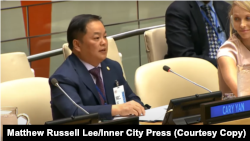An investigation published Tuesday by a global journalism network alleges that two Chinese-born individuals, previously convicted in a U.S. court for bribery, paid more than $1 million to U.N. diplomats to gain access to the world body’s New York headquarters.
The Organized Crime and Corruption Reporting Project — widely known as OCCRP — reports that Cary Yan and his assistant Gina Zhou paid for access to high-ranking officials over several years starting in 2015, and sought to create a charity that could join the U.N.’s Economic and Social Council (ECOSOC).
Earlier this year, Yan was sentenced in a separate case to three years and six months in prison by a federal court in New York after pleading guilty to paying tens of thousands of dollars in bribes to elected officials of the Republic of the Marshall Islands in exchange for passing legislation that would have benefited his business interests. Yan’s assistant, Zhou, was sentenced to two years and seven months in prison for her role in that scheme and has since been released and deported to the Marshall Islands.
According to reports, the pair are naturalized Marshall Islands citizens originally from China, although OCCRP quotes a former president of the island nation as saying she does not know how they got citizenship.
The OCCRP report says before the duo carried out the Marshall Islands scam, they had engaged in a scheme to buy influence at the United Nations.
“Among those who helped them were staff of the former president of the U.N. General Assembly, an alleged Chinese agent, and a disgraced ambassador then already under investigation by the FBI in a separate case,” OCCRP says.
OCCRP reports that those officials included Ugandan Foreign Minister Sam Kutesa, who served as president of the U.N. General Assembly from September 2014 to September 2015; his spokesperson Jean Victor Nkolo; and then-Ambassador of the Dominican Republic to the United Nations, Francis Lorenzo.
Kutesa and his spokesperson allegedly helped get Yan and Zhou photos with then-Secretary-General Ban Ki-moon on the sidelines of a climate conference. U.N. Spokesman Stephane Dujarric told OCCRP that Ban did not know that someone had paid to have a photo taken with him.
Dujarric said the U.N. first became aware of the pair’s activities during a broader internal investigation that confirmed they had paid for their U.N. meetings but that none of the money had gone through the organization’s bank accounts.
The OCCRP report quoted Dujarric saying that the U.N.’s investigation “found that Yan and Zhou used proxies to send at least $150,000 from China disguised as ‘tuition fees’ into a ‘shadow account’ run by Ugandan diplomats. Kutesa’s spokesman, Nkolo, resigned from the U.N. before the inquiry concluded.
Kutesa was also implicated in a separate 2019 bribery case in the United States involving an individual linked to a Chinese oil and gas company.
The role of Ambassador Lorenzo, who also pleaded guilty in an earlier bribery and money laundering scheme in the U.S. but still retained his access to U.N. headquarters until 2018, was to help Yan and Zhou to acquire an existing non-governmental organization with U.N. accreditation, rename it and use it to gain access to senior U.N. diplomats and officials.
“U.S. prosecutors would later reveal that Yan had paid Lorenzo $1 million to facilitate the takeover,” the report said.
Using their new NGO as cover and with Lorenzo’s contacts, OCCRP says the schemers reached out to small and poorer states to sponsor events that Chinese backers would pay for. They sought photos with diplomats for themselves and other Chinese businessmen to give them the illustrious veneer of United Nations backing.
The scam began to unravel when the woman who sold the NGO to Yan and Zhou was approached by the FBI in 2019 in connection with evidence that the U.S.-based charity was used to facilitate the bribery of officials from the Marshall Islands.
“I think the story underscores the need for all those who have access to this building to understand that it is something to be protected and not to be sold in any manner,” U.N. Spokesman Dujarric said Tuesday in response to a question from VOA. He added that the organization is cooperating with local law enforcement.




